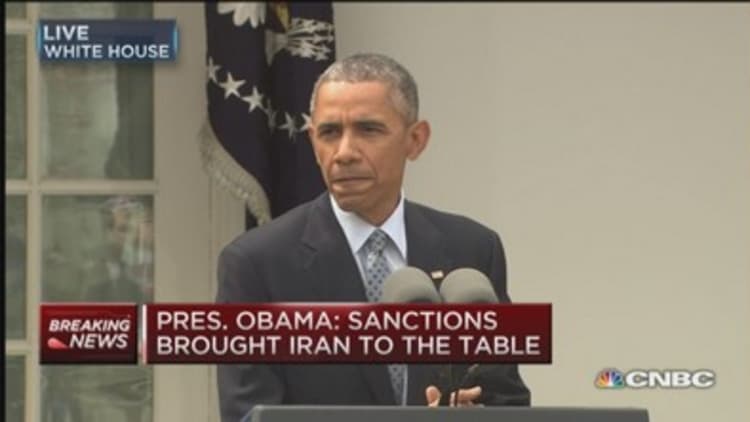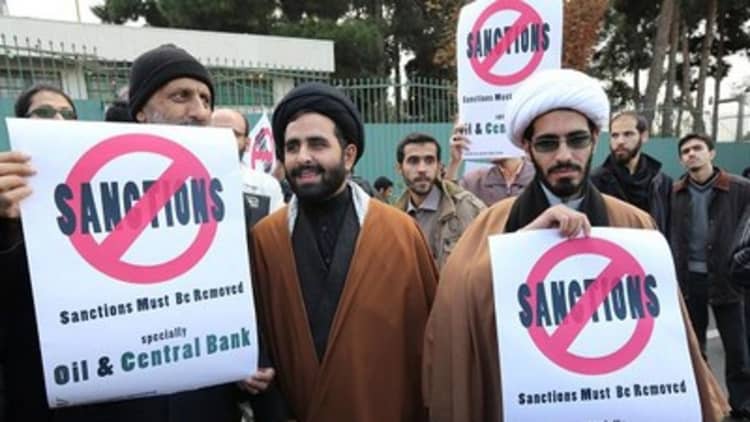




The just-announced framework for a nuclear deal with Iran would make the world a safer place if implemented, President Barack Obama said Thursday afternoon.
The European Union and Iran announced earlier Thursday in a joint statement that talks would be extended until June 30, but officials said they had reached key agreements on compliance and enrichment issues, and would now focus on the text specifics of the deal.
Although the president emphasized that nothing is finalized until the deal is signed, he said he believed a completed deal "will make our country, our allies and our world safer."
A fact sheet on the agreement from officials said that nuclear-related sanctions from the U.S. and Europe would be suspended after the International Atomic Energy Agency verified that Iran had taken all of the key nuclear-related steps.
"It is a good deal, a deal that meets our core objectives," Obama said, adding "this deal is not based on trust, it's based on unprecedented verification."
The president also said the deal framework would have the strictest protections to make sure that Iran did not covertly develop a nuclear weapon.
Obama said that the U.S. only had three real options in dealing with Iran: It could establish a deal with the country, it could bomb Iranian nuclear facilities, or it could withdraw from talks and trigger a renewed nuclear arms race.
"Should negotiations collapse because we the United States rejected what the majority of the world considers a fair deal...it's doubtful we can even keep our current international sanctions in place," the president said, challenging critics to consider if the deal is worse than the alternative options.
"A diplomatic solution is the best way to get this done, and offers a more comprehensive and lasting solution. It is our best option by far," he said, adding that the framework of inspections would increase the international community's insight into Iran's nuclear activity.
Read MoreIran talks: Solutions reached on key parameters
Speaking to Israeli Prime Minister Benjamin Netanyahu's public worries that a deal with Iran would not prevent the country from obtaining a nuclear weapon, Obama emphasized that he believed diplomacy the best option. He added that he will be speaking with the Israeli leader later on Thursday to clarify American support for his country's security.
Obama said he also spoke with the king of Saudi Arabia to reaffirm the U.S. commitment to the security of its allies in that region.
The president remarked that the deal with Iran was a global project, and warned that the U.S. would be at fault for international instability if Congress were to vote down the agreement.
"If Congress kills this deal not based on expert analysis and without offering any reasonable alternative, then it's the United States that will be blamed for the failure of diplomacy, international unity will collapse and the path to conflict will widen," Obama said.
House Speaker John Boehner, however, announced his opposition to the agreement after the president spoke.
"The president says negotiators have cleared the basic threshold needed to continue talks, but the parameters for a final deal represent an alarming departure from the White House's initial goals," he said in a news release. "My longtime concerns about the parameters of this potential agreement remain, but my immediate concern is the administration signaling it will provide near-term sanctions relief."
Iran and major world powers have been negotiating for more than a week in Lausanne, Switzerland, aiming to strike a deal that would form the basis for an accord on reining in Iran's nuclear program.
Read MoreIran deal: 'No happy ending' for Middle East
Representatives from the U.S., U.K., France, Germany, Russia and China failed to reach an agreement with Iranian officials by the initial Tuesday deadline.
Negotiations have become a politically divisive topic globally. The talks hold ramifications for the international oil market, as sanctions on the Middle Eastern nation have restricted oil exports.
Brent crude was down nearly 5 percent on Thursday. Traders are betting that a deal could mean Iranian oil would come to the global market.
—CNBC's Jacob Pramuk and Reuters contributed to this report.


